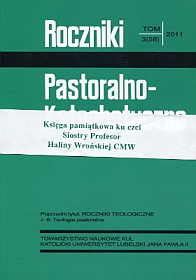Katecheza ukierunkowana na stawianie pytań – kształtowanie „postawy pytajności” wśród uczniów
Abstrakt
Catechesis that is open to man and his development is in close contact with the catechized one, who not only profits from it, but at the same time takes part in creating it. In the field of revealing problems, as well as of asking questions, the catechized ones, especially young people, have to overcome several difficulties: first they have to realize the problem, then to formulate it, and finally, to put it into words in the face of the catechist, or even of the whole group. Each of these stages encounters some difficulties. Especially, when particular stages are accompanied by fear connected with formulating the problem itself, or fear of the reaction of the group. In all these stages the catechist should help the catechized one: he should facilitate the realization of the existing problem, then he should help to formulate it, and especially to ask the question. There is a possibility that the catechist, using the proper introduction, will lead the catechized one to the situation in which he will feel the problem and formulate the question. Contemporary catechesis may only be realized in the form of a dialogue of the catechized ones and the catechist, in their mutual openness to reality and to each other. The dialogue is inherent in the essence of catechesis.
Bibliografia
Kiciński A.: Katecheta. W: Leksykon teologii pastoralnej. Red. R. Kamiński. Lublin: TN KUL 2006 s. 336-339.
Kiciński A.: Pedagogiczne poszukiwania m(M)istrza dialogu. „Katecheta” 51:2007 nr 7-8 s. 107-115.
Mąkosa P.: Katecheza młodzieży gimnazjalnej w Polsce. Lublin: Wydawnictwo KUL 2009.
Wrońska H.: Katecheza a małe grupy szkolne i parafialne. Lublin: Wydawnictwo KUL 2007.

